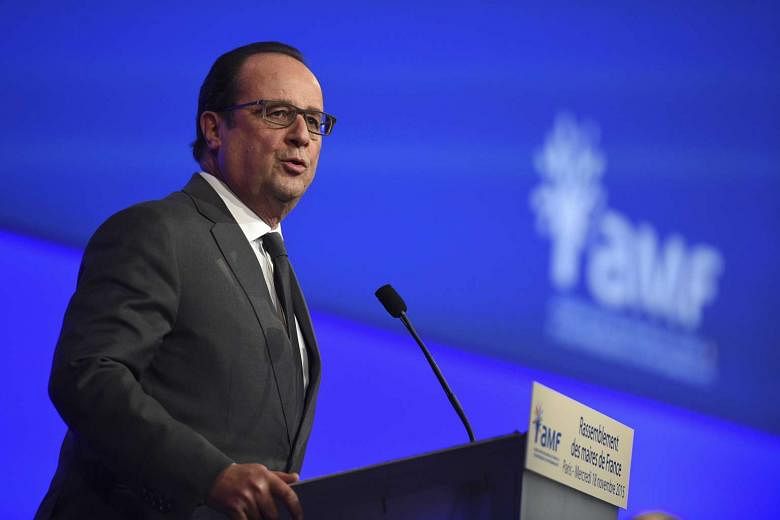French President Francois Hollande will make a previously unscheduled trip to Washington next Tuesday, to coordinate efforts in the fight against the Islamic State in Iraq and Syria (ISIS) after the Paris attacks.
The announcement comes as France seeks to build a grand coalition, which includes the United States and Russia, to battle the terrorist group, but experts believe the meeting in Washington will be mainly symbolic and that there is little France can do to sway the Americans to put boots on the ground or get Washington to coordinate more closely with Moscow.
US Secretary of State John Kerry told reporters on Tuesday that the United States and Russia could begin cooperation on a broader scale only if there is a ceasefire and a political transition in Syria.
Russia is throwing its weight behind the government of President Bashar al-Assad, while the US supports Syrian opposition groups and fears that any information shared with Moscow would be used against these groups.
Said Mr Kerry: "It would be more effective if we are exchanging information and working together to attack Daesh (the Arabic term for ISIS)... but we're not there yet."
A statement released by the White House on Tuesday said that US President Barack Obama and Mr Hollande would "discuss further cooperation as part of the 65-member counter-ISIL coalition" and reaffirm "shared determination to confront the scourge of terrorism" during the visit. ISIL is another acronym for ISIS.
Mr Hollande will travel to Moscow to meet Russian President Vladimir Putin next Thursday. Mr Putin had on Tuesday instructed the Russian Navy to work with French vessels as allies - perhaps one of the first steps towards France's desired military alliance.
France has also appealed to European Union countries for help by invoking a little-used EU treaty provision for collective defence.
Experts say that this move, instead of invoking the US-led North Atlantic Treaty Organisation's Article 5 - also a collective defence provision - is another signal of US opposition to the single coalition that Mr Hollande proposes.
Department of history chair at Cornell University Barry Strauss said: "The American strategy against ISIS is to wage a low-level air war and to give limited support to local allies such as the Kurds to keep ISIS contained without further changing the balance of power in the Middle East." "The US government would not favour raising the temperature by a dramatic action such as having an ally invoke Article 5," he added.
For the moment, the US has said it will intensify air strikes to counter ISIS and streamline its process of sharing intelligence with France, which experts say is an important move.
"There is a need for a systemic and institutionalised sharing mechanism among like-minded nations," said law professor Amos Guiora from the University of Utah, a counter-terrorism and national security expert. "Without really sophisticated information, weapons are nothing more than toys."
But Mr Obama has strongly rejected calls for a large number of American boots on the ground - a strategy, which Prof Guiora says is unlikely to change, though he is quick to add that "with so many factors going into this, another attack might be a total game changer."
Experts also agree that if nothing else, Mr Hollande's trip to Washignton will serve a symbolic purpose.
The meeting will "help France in the international arena, and help Hollande politically by counteracting any French feeling of being isolated or abandoned," said Prof Strauss.

